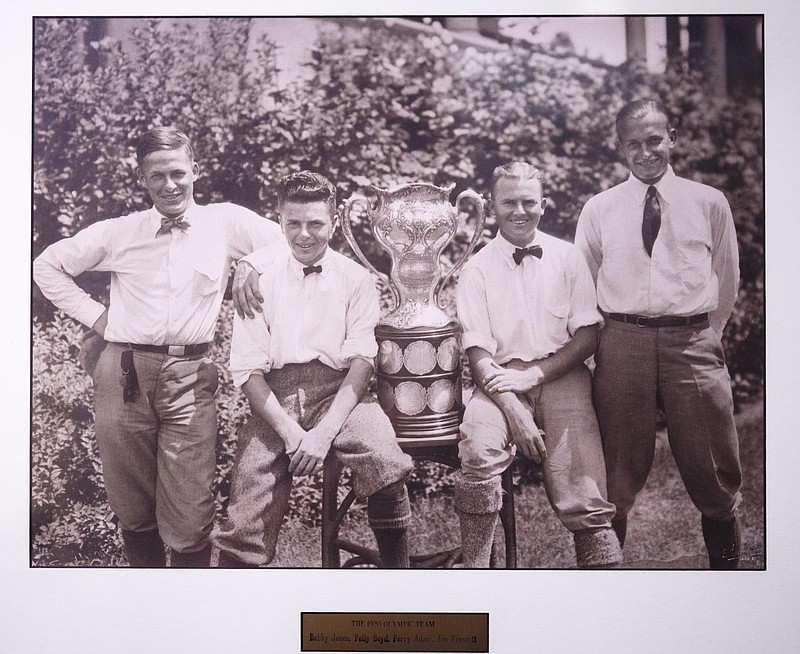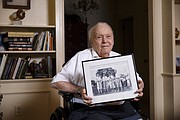The black and white photograph hangs in a hallway at the Chattanooga Golf and Country Club. It's a picture of the 1920 United States Olympic golf team, the last such group chosen to represent this country at the Summer Games until this year's American golfers began competing - as individuals - in Rio de Janeiro a few days ago.
Only that foursome of Chattanooga's Polly Boyd, legendary amateur Bobby Jones, Perry Adair and Jim Prescott never made it to those Olympics in Antwerp, Belgium.
"Lack of funds," Boyd's 88-year-old son Lew said as he sat in his Riverview home Saturday afternoon, surrounded by his wife, Ann, and their three dogs: samoyeds Kiska and Attu and lovable mutt Jethro. "The group that was putting it together ran out of money."
And because the U.S. wasn't the only team to send its regrets, golf was canceled from those Games, much as it had failed to show up in any other Olympics after 1904, which meant 112 years had come and gone without Olympic golf until it reappeared at Rio's Barra da Tijuca layout, where Great Britain's Justin Rose (12 under par) leads Sweden's Henrik Stenson (11 under) by one stroke heading into today's final round.
Australia's Marcus Fraser is all alone in third at 9 under. Bubba Watson is the only American within reasonable striking distance, tied with two others in fourth place at 6 under.
"Dad would be very happy they've brought it back," Boyd said. "He loved golf."
But golf in those days was far different than golf today. The forerunner of today's PGA Tour wouldn't come along until 1929. Following a collegiate career at Dartmouth in which he won two Intercollegiate Golf Association titles, Polly Boyd returned home to the Scenic City and helped found an insurance firm that would become Associated General Agency.
He died in 1964 at the age of 64, as well known locally for his practical jokes as he was nationally for his golf.
"My grandfather loved disappearing ink," said grandson Martin, the second oldest of Lew and Ann Boyd's three sons (Pollack, who's deceased, and Llewelyn), plus daughter Bobbie.
"One day while he was eating lunch with some Provident people, he shot some ink on this guy. All the Provident guys apparently wore white shirts and skinny black ties. This man was livid. The only reason he didn't flatten my grandfather was that 'Big Polly' - that's what's we called him - was laughing so hard he was already on the ground."
While Lew won't admit to any disappearing-ink pranks, he did follow in his father's footsteps in other areas, attending both McCallie and Dartmouth - "My dad asked me if I wanted to go to college, then said unless I went to Dartmouth I wasn't going anywhere," he recalled with a laugh - and returning to Chattanooga after serving aboard the USS Algol in the Korean War as a member of the Navy.
"We got to Korea just in time for the American attack," Lew Boyd said. "This was the Battle of Inchon. I was lucky as heck I had a choice to go into the Navy. If I'd been a Marine, I might not be here today."
He even felt lucky that the Navy paid him $50 a month during his three years of service.
"That was a lot of money back then," he said.
Given his golfing resume, there's no telling how much money Polly Boyd could have made had there been a PGA Tour during the Roaring Twenties. He won four Tennessee state amateur titles, served as president of the Tennessee Golf Association in 1939 and was the Southern Golf Association president from 1950 through 1952. He was posthumously inducted into the Tennessee Golf Hall of Fame in 2003.
And through all those years he maintained a close friendship with the incomparable Jones, who remains the only sports figure to have two ticker-tape parades held in his honor in New York City - one in 1926 and one in 1930 when he won golf's Grand Slam at that time: The Amateur Championship at St. Andrews, Scotland; the British Open; the U.S. Open; and the U.S. Amateur.
How dominating was Jones in those days? He was so confident of completing the Grand Slam in 1930 that he bet on himself with odds of 50-1, then collected $60,000 from British bookmakers when he won.
"A very nice man, a wonderful man," Lew Boyd said of Jones. "I had my picture taken with him when I was 9 years old. His son, Bobby III, went to Baylor and played against me when I was at McCallie. Whenever Mr. Jones came to town to watch his son play, we'd see him. My dad always talked about Mr. Jones in the highest manner."
But Jones - who widely was considered one of America's five athletic giants of the 1920s, along with baseball's Babe Ruth, boxing's Jack Dempsey, football's Red Grange and tennis star Bill Tilden - was stricken in 1948 with syringomyelia, a spinal-cord malady that eventually forced him into a wheelchair. He died in Atlanta in 1971. Bobby III died three years later of a heart attack.
Moving to Florida later in life, Polly Boyd continued to play golf, "and play it well," according to his son.
He also kept the medals he'd received for his collegiate golf titles and the medal the U.S. Olympic Committee gave him and his 1920 teammates close by his side.
Said grandson Martin, smiling at the memory: "He'd jingle those medals in his pockets like some people jingle change."
Whether the return of golf to the Olympics can put a jingle in the pockets of television advertisers probably won't be known for weeks. These Games certainly lacked the star power the Rio organizers surely hoped for, given that Rory McIlroy, Jordan Spieth, Dustin Johnson and Tiger Woods all skipped the event, blaming everything from the Zika virus to other health issues to general disinterest.
"In four more years, I think that will change," said Lew Boyd, who played one year of golf at Dartmouth and was a longtime board member of the Southern Golf Association. "I think a lot more golfers will want to compete for a gold medal."
If not, it might be another 112 years before the world's best golfers next get a chance to win a medal they can later jingle in their pockets.
Contact Mark Wiedmer at mwiedmer@timesfreepress.com.

